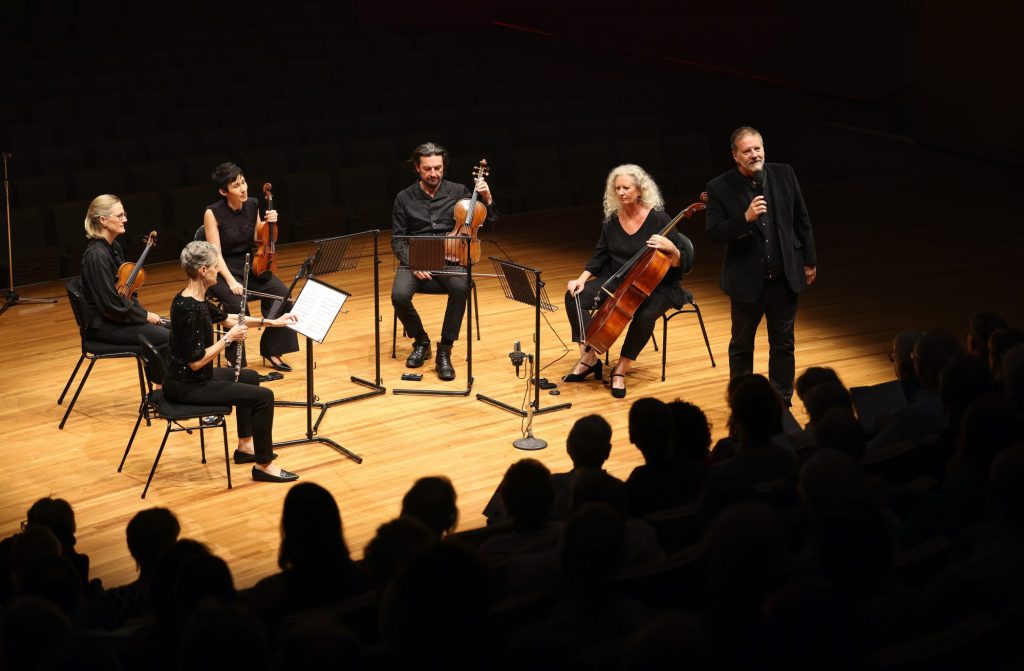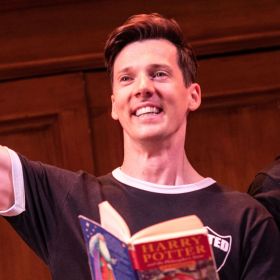An intriguing title, Ensemble Q’s The Trout offered concert-goers its central drawcard of Schubert’s glorious and much-loved Trout Quintet for violin, viola, cello, double bass and piano, played in the second half as the finale. Additionally, the concert featured four distinctly different quintets in the first half of the program – each showcasing a wind instrument (bassoon, flute, clarinet and French horn) that highlighted the virtuosity of those instruments. And each with an impeccably credentialled player joining the core string quartet.
The string quartet – comprising regulars Anne Horton on violin and Trish Dean, co-Artistic Director of Ensemble Q, on cello – were joined by two new ensemble members in the 2024 player line-up. co-Artistic Director, Paul Dean, introduced audiences to violinist, Sophie Rowell, and violist, Christopher Moore.
Rowell is the current Artistic Director of Melbourne Chamber Orchestra and was previously Concertmaster of the Melbourne Symphony Orchestra (MSO). Moore was Principal Viola with the Australian Chamber Orchestra and is currently Principal with the MSO. They are distinguished additions both and provided a welcome opportunity for Brisbane audiences to hear respected musicians from other parts of the country.
Anton Reicha’s Variations for Bassoon and Strings opened the concert. A contemporary of Beethoven, Reicha was a prolific composer of the early 19th century, especially of chamber music, but is relatively forgotten nowadays. This composition, with its infectious opening theme leading to several short but joyous variations, was played with a delightful lightness of touch by the strings. The first violin of Rowell offered some fine arpeggios above the darker undercurrent of viola and cello. It was also terrific to hear a piece where the rich, dark sound of the bassoon was prominent, as we so seldom hear this instrument featured as a solo. David Mitchell played extremely well, his brisk vibrant bassoon rising strongly over the strings with excellent harmonics and intonation. A lovely opening work.
Amy Beach’s Theme and Variations for Flute and String Quartet, written a century later, is equally a romantic work like Reich’s but from the US style of the early 20th century with its yearning, melodic lyricism. Thematically based on a lullaby, it commenced with an expressive slow melody from the string quartet. The flute entered after the Theme, rising high above the strings in an impressive and haunting solo.
Harmonically complex, Alison Mitchell’s flute demanded sustained breath control, which she managed beautifully in an expressive descant over the strings. A series of variations offered opportunities for individual instruments to shine, from an evocative and powerful flute through a slow, sweet cello and a brisk viola. Mitchell’s flute soared magnificently with many trills over the strings in the final variations to a slow, sustained ending that was quite magical. A fascinating and ambitious work.
Lachlan Skipworth’s Clarinet Quintet was written in 2016 and offered a complete contrast to the musical styles of Reicha and Beach. Skipworth describes it as ‘a dystopian response to our current time’. Certainly, the sadness of his harmonic music and its lengthy melodic lines evoke a deep and almost distressing emotive response. The work builds with an increasing urgency in the strings offering fierce metallic bowings from the violins and viola before reverting to an uneasy state of acceptance at the end.
The writing for the clarinet is intense, producing a deep richness of sound from the instrument mirrored to a great extent in the strings and some equally disquieting moments. One could think of few clarinettists outside of Paul Dean who could play this music with such a riveting intensity of feeling and passion. It was an astonishing performance of a deeply disturbing work from a master.
Alexander Glazunov, a contemporary of many great Russian composers of the early 20th century, is relatively unknown today, but was an important composer of the period. His Idyll for Horn and String Quartet is a charming work, though considered old-fashioned in style at the time, with its emphasis on pastoral scenes, enchanting landscapes and idyllic summer breezes. It commenced with the sweetness of the French horn, delightfully played by Peter Luff, who was joined by the lyricism of the strings. A play back and forth between horn and violin ensued in a playful interchange that was lightly and carefully played. The horn rose hauntingly, sweet and melodic, in a descant above the gentle delivery from the strings. The piece was managed with aplomb and great attention to detail, and Luff’s playing was superb.
Schubert’s Quintet in A major for Violin, Viola, Cello, Double Bass and Piano, Op 114 Trout was the icing on the cake of this concert. It was played and delivered brilliantly by all five musicians, who worked exceptionally well together. Sophie Rowell was violinist, while Phoebe Russell joined as the bass player with Daniel de Borah on piano. What is remarkable about Schubert’s Quintet is that it is completely joyous from start to finish, intelligently written for every instrument to have the chance to shine within the score. The piano in particular is very well served. It plays almost non-stop and de Borah was first-rate.
Composed in five movements, The Trout starts with an ‘Allegro Vivace’, a very fast and energetic piano from de Borah with trills and arpeggios mostly in the upper register, and some lovely cello accompaniment. The second slow ‘Andante’ movement is lyrical and melodic, producing a rhythmic piano while the strings take up the theme to produce expressive harmonies. The ‘Scherzo: Presto’ movement is brisk, the piano playing descant above the strings, led keenly by the first violin, with some lovely phrasing from the double bass. The ‘Andantino – Allegretto’ offers a familiar tune passed from the violin to viola, cello and bass, with an excellent cello solo and a speedy piano in the highest register complete with arpeggios. The exuberant ‘Allegro Giusto’ follows as a spirited and lively finale that is rhythmically colourful and overflowing with excitement. A terrific end to The Trout.
Read: Opera review: Hansel & Gretel, St Andrew’s Uniting Church, Brisbane
By exploring the virtues of the quintet form, Ensemble Q introduced audiences to some unknown pieces as well as giving a delightfully exuberant performance of the famous Trout Quintet. All in all, a terrific concert with some real gems.
QPAC and Ensemble Q presented
The Trout
Co-Artistic Directors: Paul and Trish Dean
Musicians: Sophie Rowell, Anne Horton, Christopher Moore, Trish Dean, Phoebe Russell, David Mitchell, Alison Mitchell, Paul Dean, Peter Luff, Daniel de Borah
The Trout was performed 14 April 2024.
Ensemble Q’s next two concerts are:
Boots & All – Queensland Performing Arts Centre (QPAC)
Frankenstein!! & The Goose’s Mum – Queensland Performing Arts Centre (QPAC)





